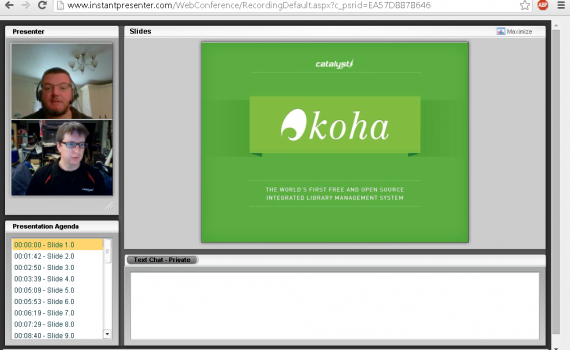
ABOUT THE RESOURCE
Advocating for FOSS can be a difficult task. Providing the right kinds of information, exemplars of where it has been successful, and the benefits it may bring to your library, takes a lot of time and effort to compile, and then has to be presented in a way that will inform but not bore the decision-makers. Many technicians and librarians can face an uphill battle in convincing senior managers of its value and the benefits of moving to FOSS.
Koha is perhaps one of the most successful FOSS tools currently, and as such the case for advocacy around Koha is stronger than it may be for software that is less well known. Koha is a well-established FOSS ILS and several EIFL libraries are now using it.
To begin to address some of these issues, EIFL-FOSS held a Themed Week session focussing on Koha and library FOSS advocacy.
This workshop featured contributions from three people who can all help you to advocate for FOSS tools, through their experiences with Koha. Their presentations can be downloaded from this page.
- David Parkes, Associate Director Information Services, Staffordshire University, UK (the first UK University to move fully to Koha). Download David's presentation here: dparkescaseforkoha.ppt
- Dibyendra Hyoju, Madan Puraskar Pustakalaya, Nepal. Download Dibyendra's presentation here: dibyendra_virtual_union_catalog_using_koha_ils.ppt and download the Shockwave Flash presentation Dibyendra made here: dibyendravirtual_union_catalog_using_koha_ils_presentation.swf
- Gantulga Lkhagva, Mongolian Libraries Consortium. Download Gana's presentation here: ganakoha_in_mongolia.ppt
The workshop is supported by an open access wiki for Questions and Answers about Koha and FOSS advocacy. If you have any questions about Koha or FOSS advocacy please add them to the titanpad.com/eifl-foss-koha-advocacy wiki.
What is Koha?
Koha is an Integrated Library System with a range of features including:
- Online Public Access Catalogue (OPAC) module which provides a simple and clear interface for library users to perform tasks such as searching for and reserving items and suggesting new items.
- Full catalogue module which enables library staff to capture details of all library items. It is MARC compliant, and also z39.50 compliant, meaning data entry and exchange will be greatly simplified.
- Circulation module which fully automates borrowing and item management, integrating with the OPAC so users can see which items they have outstanding, for example.
- Acquisitions module which assists librarians with both acquisitions and more generally with budget management. Serials management and reporting modules perform functions that their names would suggest.
Koha is designed to work on Linux, but will work on Windows with the installation of a series of additional modules. It is operable in English. Spanish, Arabic and French, with other languages being developed and translated by the community members. It is released under a GNU General Public License (GPL)
Koha is is a well-established FOSS ILS and perhaps one of the most successful library FOSS tools currently, and as such the case for FOSS advocacy around Koha is stronger than it may be for software that is less well known.
What are the benefits of Koha?
- Easy access to information for library staff and users due to effective searching and issuing of items.
- Automation of alerts to remind patrons and staff about, for example, overdue items or arrival of new items.
- Reduced time of processing of library items, due to MARC and z39.50 compatibility.
- Online supervision becomes possible, reducing the line management responsibilities of senior staff.
- Library management becomes easier through automated collection of data.
- Through the acquisition module budgets can be more effectively managed.
- Koha brings together library users and staff, as both can see various aspects of the system and can work together more effectively to achieve each user's goals.
Useful information about Koha


SHARE / PRINT









